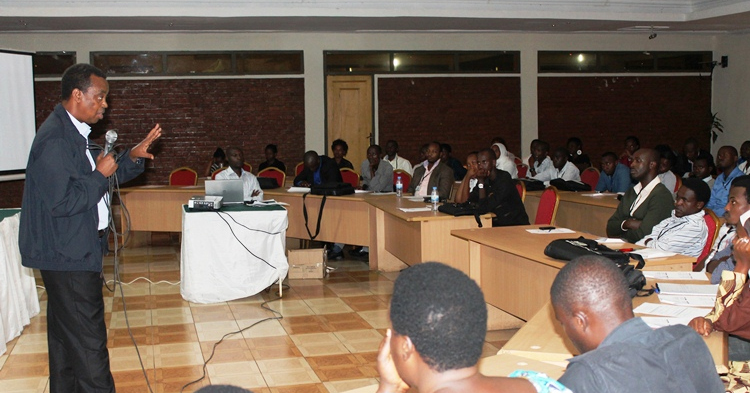A genuine politician, who loves the country and its people, is the one who aims for a good cause and is ready to die for it if necessary. This is the statement by the Executive Secretary of the Forum when he was officially launching the training intended for the youth from different political organisations on politics and governance, this Saturday, 1st February 2014, a date coinciding with the commemoration of the National Heroes’ Day. The Executive Secretary of the Forum told them that a Hero is a person who is committed to achieving his goal, which, when achieved, becomes an outstanding achievement useful for his people. In pursuing his or her goal, s/he does it with nobility, outstanding sacrifice seeing to it that s/he takes up the challenge at all cost.
In this lecture, the Executive Secretary provided the youth with information about the Forum, its background, its responsibilities as well as its organs.
He informed them that the Forum is a free platform bringing together political organisations recognised in Rwanda, which request to join the Forum and whose application is accepted. Within the Forum, political organisations share ideas on major issues of the country, advise on national politics and programmes with a view to building harmony and national unity. The Forum, therefore, is a permanent organ with a mission to build member political organisations’ capacity in improving their governance and the performance of their political profession. It is also a venue for solving conflicts and reinforcing appropriate conduct that should characterise political organisations.
The youth was informed that the idea to establish the National Consultative Forum of Political Organisations was many times discussed about during the Arusha Peace Negotiations. The intention was to make sure that power sharing is based on national interests and the building of a country characterised by the rule of law. The Executive Secretary informed them that what was urgent was to train members of political organisations by organising political training aiming at helping them fight together against anything that could lead to divisionism and any political exclusion.
The Executive Secretary pursued his intervention by informing participants that the Forum started with the first transition organs in 1994. It played a role in contributing to ideas meant to rehabilitate and build the new Rwanda after the Genocide Against the Tutsi. During the transition period, the Forum became also a platform whereby political organisations shared ideas and views on national politics and issues, consulting each other about the establishment of national leadership organs and appointment of its members.
When the Constitution of the Republic of Rwanda was voted on, Rwandans from all walks of life approved that the Forum be reinforced and consolidated to become a permanent organ emphasizing political organisations’ role in supporting and promoting power sharing, respect of multiparty democracy.
The Executive Secretary also explained to participants the functioning of the Forum’s organs and how they complement each other. They were informed that the General Assembly is the supreme organ of the Forum, that the latter is led by a Bureau and that it has three permanent Committees, as well as the Executive Secretariat made up of the Executive Secretary of the Forum elected by the General Assembly Meeting as well as support staff helping him in implementing the recommendations from the General Assembly and other daily activities of the Forum.
The questions raised focused on how the Forum could inform local structures about its activities; where its budget comes from and how the follow-up for the youth having completed the YPLA programme is made.
They were reminded that when political organisations are well performing, this implies that the Forum’s output is good. The youth were requested to be the basis for the visibility of the Forum’s actions.
As for the budget used by the Forum, participants were informed that the budget comes from the Government’s grant and from the Forum’s stakeholders, such as the United Nations Development Programme (UNDP), which is currently working with the Forum.
Concerning the implementation of the lessons learnt, the youth were informed that the General Assembly Meeting decided that the youth completing the YPLA training should be resorted to by their respective political organisations to train, in turn, their members and to carry out some tasks within political organisations. The YPLA graduates, it was also decided, should even be appointed to various leadership organs of their respective political organisations.
The Executive Secretary of the Forum concluded his intervention by officially opening this training. He requested the youth to show diligence in the training after which they should significantly contribute to the development of their respective political organisations, which selected them to attend this training.

